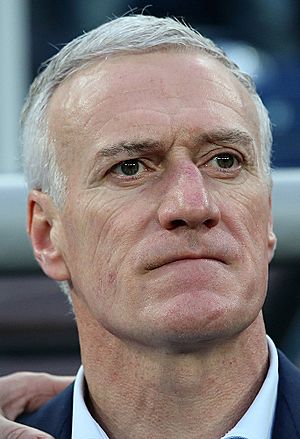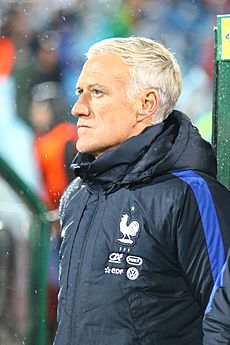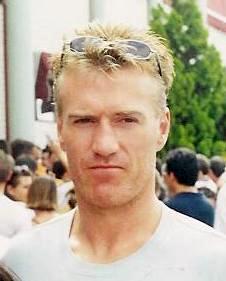Didier Deschamps facts for kids

Deschamps as France manager in 2018
|
|||||||||||||||||||||||||||||||||||||||||||||||||
| Personal information | |||||||||||||||||||||||||||||||||||||||||||||||||
|---|---|---|---|---|---|---|---|---|---|---|---|---|---|---|---|---|---|---|---|---|---|---|---|---|---|---|---|---|---|---|---|---|---|---|---|---|---|---|---|---|---|---|---|---|---|---|---|---|---|
| Full name | Didier Claude Deschamps | ||||||||||||||||||||||||||||||||||||||||||||||||
| Date of birth | 15 October 1968 | ||||||||||||||||||||||||||||||||||||||||||||||||
| Place of birth | Bayonne, Pyrénées-Atlantiques, France | ||||||||||||||||||||||||||||||||||||||||||||||||
| Height | 1.74 m (5 ft 9 in) | ||||||||||||||||||||||||||||||||||||||||||||||||
| Position(s) | Defensive midfielder | ||||||||||||||||||||||||||||||||||||||||||||||||
| Team information | |||||||||||||||||||||||||||||||||||||||||||||||||
|
Current team
|
France (manager) | ||||||||||||||||||||||||||||||||||||||||||||||||
| Youth career | |||||||||||||||||||||||||||||||||||||||||||||||||
| 1976–1983 | Bayonne | ||||||||||||||||||||||||||||||||||||||||||||||||
| 1983–1985 | Nantes | ||||||||||||||||||||||||||||||||||||||||||||||||
| Senior career* | |||||||||||||||||||||||||||||||||||||||||||||||||
| Years | Team | Apps | (Gls) | ||||||||||||||||||||||||||||||||||||||||||||||
| 1985–1989 | Nantes | 111 | (4) | ||||||||||||||||||||||||||||||||||||||||||||||
| 1989–1994 | Marseille | 123 | (6) | ||||||||||||||||||||||||||||||||||||||||||||||
| 1990–1991 | → Bordeaux (loan) | 29 | (3) | ||||||||||||||||||||||||||||||||||||||||||||||
| 1994–1999 | Juventus | 124 | (4) | ||||||||||||||||||||||||||||||||||||||||||||||
| 1999–2000 | Chelsea | 27 | (0) | ||||||||||||||||||||||||||||||||||||||||||||||
| 2000–2001 | Valencia | 14 | (0) | ||||||||||||||||||||||||||||||||||||||||||||||
| Total | 427 | (17) | |||||||||||||||||||||||||||||||||||||||||||||||
| International career | |||||||||||||||||||||||||||||||||||||||||||||||||
| 1988–1989 | France U21 | 18 | (0) | ||||||||||||||||||||||||||||||||||||||||||||||
| 1989–2000 | France | 103 | (4) | ||||||||||||||||||||||||||||||||||||||||||||||
| Managerial career | |||||||||||||||||||||||||||||||||||||||||||||||||
| 2001–2005 | Monaco | ||||||||||||||||||||||||||||||||||||||||||||||||
| 2006–2007 | Juventus | ||||||||||||||||||||||||||||||||||||||||||||||||
| 2009–2012 | Marseille | ||||||||||||||||||||||||||||||||||||||||||||||||
| 2012– | France | ||||||||||||||||||||||||||||||||||||||||||||||||
|
Medal record
|
|||||||||||||||||||||||||||||||||||||||||||||||||
| *Club domestic league appearances and goals | |||||||||||||||||||||||||||||||||||||||||||||||||
Didier Claude Deschamps (born 15 October 1968) is a famous French football manager and former player. He has been the manager of the French national team since 2012. As a player, he was a defensive midfielder for several top clubs in France, Italy, England, and Spain. These clubs included Marseille, Juventus, Chelsea, and Valencia. He also played for Nantes and Bordeaux.
Deschamps was known as "the water-carrier" because he was excellent at winning the ball back. He was also a strong leader on the field. He played 103 games for France and was captain when they won the World Cup in 1998 and the Euro 2000.
As a player, he won two French league titles with Marseille. He also helped Marseille become the first French club to win the UEFA Champions League in 1993. He was the youngest captain ever to win this title. With Juventus, he played in three Champions League finals in a row, winning in 1996. He also won three Italian league titles with Juventus. Later, he won the FA Cup with Chelsea. He is one of only a few captains to have won the Champions League, World Cup, and European Championship.
As a manager, Deschamps started with Monaco. He led them to win the Coupe de la Ligue in 2003 and reach the Champions League final in 2004. He then helped Juventus win the Serie B title in 2007, bringing them back to the top Italian league. With Marseille, he won the Ligue 1 title in 2010 and three Coupe de la Ligue titles.
Since 2012, he has managed the French national team. He led them to the quarter-finals of the 2014 World Cup and the final of Euro 2016. In 2018, he guided France to win the World Cup. This made him only the third person to win the World Cup as both a player and a manager. He also led France to the 2022 World Cup final, where they finished as runners-up.
Contents
Playing Career Highlights
Didier Deschamps was born in Bayonne, France. He started his football journey at a local amateur club, Bayonne. Scouts from Nantes noticed his talent, and he joined them in 1983. He made his first league appearance in 1985.
Success with Marseille
In 1989, Deschamps moved to Marseille. After a loan spell at Bordeaux in 1990, he returned to Marseille. Here, he won his first major trophies. He helped Marseille win two French league titles in 1991 and 1992. In 1993, he captained Marseille to win the UEFA Champions League. This was a huge achievement, as they were the first French team to win it. Deschamps became the youngest captain to lift the trophy.
Time in Italy and England
In 1994, Deschamps joined the Italian club Juventus. He had a very successful time there, winning three Serie A titles, one Coppa Italia, and two Supercoppa Italiana. He also won his second UEFA Champions League title in 1996 with Juventus. They also won the UEFA Super Cup and the Intercontinental Cup. He played in two more Champions League finals with Juventus.
After Juventus, Deschamps played one season in England with Chelsea. He helped them win the FA Cup in 2000. He finished his playing career in Spain with Valencia, reaching another Champions League final in 2001. He retired from playing in 2001 at the age of 32.
International Football for France
Didier Deschamps first played for the French national team in 1989. In the early 1990s, France struggled and did not qualify for the World Cups in 1990 and 1994.
Leading the "Golden Generation"
When Aimé Jacquet became the new coach, he started to build a new team. Deschamps, as one of the experienced players, was chosen to lead this new group, which became known as the "Golden Generation." He captained France in 1996 at Euro 96, where they reached the semi-finals.
In 1998, Deschamps captained France to win the World Cup on their home soil in Paris. He was a very important player in the team. Two years later, he also led France to win Euro 2000. This made France the first national team since West Germany in 1974 to hold both the World Cup and Euro titles at the same time. After Euro 2000, Deschamps retired from international football. He played 103 games for France and scored four goals.
Playing Style
Didier Deschamps was known for being a very smart and hard-working defensive midfielder. His main job was to stop the other team's attacks. He was excellent at winning the ball back and then passing it to his teammates to start new attacks.
He was nicknamed "the water-carrier" by a former teammate. This nickname meant he did the hard work of winning the ball and giving it to more attacking players. He had great stamina, vision, and was good at tackling. He was also a strong leader on the field. Many people consider him one of the best defensive midfielders ever.
Managerial Career
After retiring as a player, Deschamps became a football manager.
Managing Monaco and Juventus
His first coaching job was with Monaco in France. He led Monaco to win the Coupe de la Ligue in 2003. He also guided them to their first ever UEFA Champions League final in 2004. He left Monaco in 2005.
In 2006, Deschamps became the head coach of Juventus, one of his former clubs. Juventus had been sent down to the second division (Serie B) due to a scandal. Deschamps helped them win the Serie B title in 2007, bringing them back to the top Italian league (Serie A).
Leading Marseille to Success
On 5 May 2009, Deschamps was named manager of Marseille. In his first season, he led them to win their first Ligue 1 title in 18 years. He also won three Coupe de la Ligue titles in a row from 2010 to 2012. He left Marseille in July 2012.
Managing the French National Team

On 8 July 2012, Deschamps became the head coach of the France national football team. He led France through the qualification for the 2014 FIFA World Cup. They had a tough play-off match against Ukraine, losing the first leg 2-0. But in the second leg, France won 3-0, qualifying for the World Cup. At the 2014 World Cup in Brazil, his team reached the quarter-finals, where they lost to Germany.
Deschamps then led France to the final of UEFA Euro 2016, which was held in France. They played well but lost 1-0 to Portugal in extra time.
For the 2018 FIFA World Cup in Russia, Deschamps carefully chose his team. He focused on players who would work well together. France had strong performances in the knockout rounds, beating Argentina, Uruguay, and Belgium. They then won the World Cup by defeating Croatia 4-2 in the final. This victory made Deschamps only the third person in history to win the World Cup as both a player and a manager.
At UEFA Euro 2020, France were knocked out in the round of 16. In the 2022 FIFA World Cup, Deschamps led France to their second World Cup final in a row. They played a thrilling match against Argentina, drawing 3-3, but lost in a penalty shootout. In January 2023, he extended his contract with France until June 2026. France qualified for UEFA Euro 2024 by finishing top of their group. They had a record-breaking 14-0 win against Gibraltar. France reached the semi-finals of Euro 2024 before losing to Spain.
Management Style
Deschamps is known for being a very smart manager, especially in big tournaments. He likes to build teams with a strong defense and a good work ethic. His players describe him as "calm and collected," which helps the team stay focused. He is also very practical and adaptable, just like he was as a player.
During the 2018 World Cup, Deschamps used players in new ways to help the team. For example, he played Blaise Matuidi as a defensive winger to help cover the left side. This allowed Kylian Mbappé more freedom to attack from the right wing. He also used Olivier Giroud as a "false-9" striker. Giroud would use his strength to create space for other attacking players like Antoine Griezmann and Mbappé to score goals.
Deschamps believes it is very important to have a good team spirit and positive relationships among his players. He also likes to lead by example. He prefers to observe matches and discuss changes with his staff rather than giving constant instructions from the sidelines.
Personal Life
Didier Deschamps married Claude Antoinette in 1989. They have a son named Dylan, who was born in 1996. He is also a first cousin to retired professional tennis player Nathalie Tauziat.
Managerial Statistics
| Team | From | To | Record | ||||
|---|---|---|---|---|---|---|---|
| G | W | D | L | Win % | |||
| Monaco | 1 July 2001 | 19 September 2005 | 220 | 110 | 59 | 51 | 50.00 |
| Juventus | 10 July 2006 | 26 May 2007 | 43 | 30 | 11 | 2 | 69.77 |
| Marseille | 1 July 2009 | 2 July 2012 | 163 | 82 | 40 | 41 | 50.31 |
| France | 8 July 2012 | Present | 169 | 107 | 34 | 28 | 63.31 |
| Total | 595 | 329 | 144 | 122 | 55.29 | ||
Honours
Player
Marseille
- Ligue 1: 1989–90, 1991–92
- UEFA Champions League: 1992–93
Juventus
- Serie A: 1994–95, 1996–97, 1997–98
- Coppa Italia: 1994–95
- Supercoppa Italiana: 1995, 1997
- Intercontinental Cup: 1996
- UEFA Champions League: 1995–96; runner-up: 1996–97, 1997–98
- UEFA Cup runner-up: 1994–95
- UEFA Intertoto Cup: 1999
- UEFA Super Cup: 1996
Chelsea
- FA Cup: 1999–2000
Valencia
- UEFA Champions League runner-up: 2000–01
France
Individual
- Division 1 Rookie of the Year: 1989
- Onze Mondial: 1992, 1993, 1996, 1997
- French Player of the Year: 1996
- UEFA European Championship Team of the Tournament: 1996
- FIFA 100: 2004
- The Dream Team 110 years of OM: 2010
- Golden Foot Award Legends: 2018
- 9th French Player of the Century
Manager
Monaco
- Coupe de la Ligue: 2002–03
- UEFA Champions League runner-up: 2003–04
Juventus
- Serie B: 2006–07
Marseille
- Ligue 1: 2009–10
- Coupe de la Ligue: 2009–10, 2010–11, 2011–12
- Trophée des Champions: 2010, 2011
France
- FIFA World Cup: 2018; runner-up: 2022
- UEFA Nations League: 2020–21; third place: 2024–25
- UEFA European Championship runner-up: 2016
Individual
- Ligue 1 Manager of the Year: 2004
- The Best FIFA Football Coach: 2018
- Globe Soccer Awards Coach of the Year: 2018
- World Soccer Magazine World Manager of the Year: 2018
- IFFHS World's Best National Coach: 2018, 2020
Orders
See also
 In Spanish: Didier Deschamps para niños
In Spanish: Didier Deschamps para niños
- List of men's footballers with 100 or more international caps
 | Isaac Myers |
 | D. Hamilton Jackson |
 | A. Philip Randolph |


